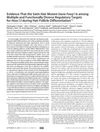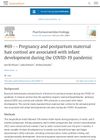 4 citations,
October 2007 in “Dermatologic Clinics”
4 citations,
October 2007 in “Dermatologic Clinics” Glucocorticoids and sex hormones affect skin health, with potential for targeted treatments to minimize side effects and treat skin conditions.
[object Object]  November 2014 in “John Wiley & Sons, Ltd eBooks”
November 2014 in “John Wiley & Sons, Ltd eBooks” Eating high-glycemic and dairy foods can increase hormones that may cause acne and other health issues.
 January 2018 in “Springer eBooks”
January 2018 in “Springer eBooks” The document says that early treatment of Acne Vulgaris is important to prevent scarring and that adult onset acne is common in women, often due to hormonal imbalances.
 October 2023 in “Journal der Deutschen Dermatologischen Gesellschaft”
October 2023 in “Journal der Deutschen Dermatologischen Gesellschaft” Pregnancy can trigger severe rosacea, which may be treated with antibiotics and steroids, but there's no clear treatment guideline.
20 citations,
December 2021 in “Plants” Tamarix aphylla may be effective for various medical conditions, but more research is needed to confirm its safety and effectiveness.
 25 citations,
August 2010 in “Journal of Biological Chemistry”
25 citations,
August 2010 in “Journal of Biological Chemistry” Nuclear Factor I-C is important for controlling hair growth by affecting the TGF-β1 pathway.
 65 citations,
July 2006 in “Journal of biological chemistry/The Journal of biological chemistry”
65 citations,
July 2006 in “Journal of biological chemistry/The Journal of biological chemistry” The gene Foxq1, controlled by Hoxc13, is crucial for hair follicle differentiation.
 August 2023 in “Vittalle”
August 2023 in “Vittalle” Mais estudos são necessários para garantir a eficácia e qualidade dos tratamentos de alopecia com plantas medicinais.

Integrin alphavbeta6 is important for wound healing and hair growth, and blocking it may improve these processes.
33 citations,
July 2007 in “Journal of cell science” Miz1 is essential for proper hair structure and growth.
 December 2024 in “Animals”
December 2024 in “Animals” RORA may help regulate hair growth by affecting hair follicle stem cells.
 February 2020 in “Diabetologie Und Stoffwechsel”
February 2020 in “Diabetologie Und Stoffwechsel” The document concludes that more research is needed to include new treatments in guidelines for Polycystic Ovary Syndrome (PCOS).
 24 citations,
May 1963 in “Archives of Dermatology”
24 citations,
May 1963 in “Archives of Dermatology” Most new moms had their hair grow back within 4-6 months after childbirth, and hair loss is likely due to hormonal changes.
 7 citations,
January 2015 in “Journal of the European Academy of Dermatology and Venereology”
7 citations,
January 2015 in “Journal of the European Academy of Dermatology and Venereology” Only about 20% of women have hair loss after childbirth severe enough to be considered clinically significant.
 1 citations,
February 2022 in “International Journal of Dermatology”
1 citations,
February 2022 in “International Journal of Dermatology” Some skin changes from pregnancy like hair loss, excessive hair growth, palm redness, and stretch marks may not go away after birth and could suggest a misdiagnosis or hidden condition.
 1 citations,
January 2022 in “Skin appendage disorders”
1 citations,
January 2022 in “Skin appendage disorders” Hair shedding after childbirth can reveal a pre-existing condition of hair loss due to tight hairstyles.

Postpartum hair loss can reveal hidden hair loss conditions.
 January 2017 in “Archives of Aesthetic Plastic Surgery”
January 2017 in “Archives of Aesthetic Plastic Surgery” Hair care products with placental growth factor can improve hair thickness and density in postpartum hair loss.
 4 citations,
July 2013 in “Journal of Dermatological Science”
4 citations,
July 2013 in “Journal of Dermatological Science” Pregnancy right after giving birth in mice lacking IL-10 causes milk that leads to liver issues and hair loss in their babies.
[object Object]  February 2024 in “Psychoneuroendocrinology”
February 2024 in “Psychoneuroendocrinology” Mothers with lower stress during pregnancy but higher stress after birth had infants with lower development scores.
 September 2023 in “Journal of The American Academy of Dermatology”
September 2023 in “Journal of The American Academy of Dermatology” Social media discussions reveal that postpartum hair loss is a common concern among new mothers.
 19 citations,
May 1984 in “Digestive diseases and sciences”
19 citations,
May 1984 in “Digestive diseases and sciences” A young woman's Cronkhite-Canada syndrome improved on its own after she gave birth.
1 citations,
December 2021 in “American Journal of Obstetrics and Gynecology” Hair cortisol levels peak in the third trimester and decline postpartum.
 August 2020 in “Current psychopharmacology”
August 2020 in “Current psychopharmacology” Pregnancy and nursing increase certain brain activities in rats, but these changes disappear when the babies are taken away.
 5 citations,
September 2016 in “Journal of Cosmetic Dermatology”
5 citations,
September 2016 in “Journal of Cosmetic Dermatology” Nourkrin® with Marilex® may increase hair count by 35.7% in postpartum hair loss.
 November 2021 in “Dermatology Research and Practice”
November 2021 in “Dermatology Research and Practice” The study aims to understand the skin and hair characteristics of mothers and their babies, and how these may affect newborns' skin health and mothers' postpartum hair loss.
 January 2024 in “Deleted Journal”
January 2024 in “Deleted Journal” Most mothers who get postpartum care are healthy during the postpartum period.
 October 1961 in “Archives of Dermatology”
October 1961 in “Archives of Dermatology” Reassurance is important for postpartum hair shedding as it likely won't cause complete baldness.
 214 citations,
March 1993 in “Archives of Dermatology”
214 citations,
March 1993 in “Archives of Dermatology” Telogen effluvium is a reversible hair loss condition that requires a detailed diagnosis and often resolves on its own.
 137 citations,
June 2005 in “Climacteric”
137 citations,
June 2005 in “Climacteric” Estrogen loss during menopause worsens skin health, but hormone replacement therapy may improve it, though more research is needed.



























